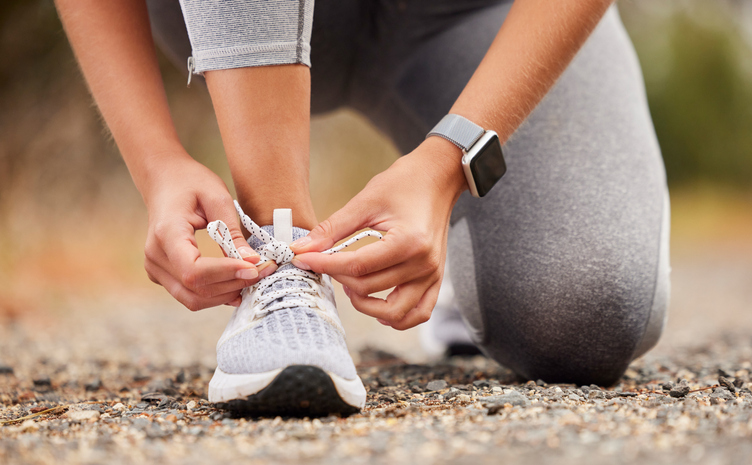Having Surgery Soon? Here’s Why You Should Walk Right Into It

By Joy Stephenson-Laws, JD, Founder
“Momager” of the Kardashian empire, Kris Jenner, underwent hip replacement surgery about a year ago or so. I did not know this until recently. I don’t really follow this family much, but I do know they are usually interested in glamor and beauty. Hip surgery is not exactly a glamorous topic, but Jenner shared her journey through her family’s reality TV show.
"I've walked twice," Jenner said during her recent postoperative recovery period, according to this article from People Magazine.
"I got up the first time to walk on my little walker over there. It was painful, but it's like, hey let's keep doing this."
I like her attitude. Walking after surgery, even if it is painful, is important for recovery and preventing future issues.
“Early walking after surgery is one of the most crucial things you can do to prevent problems. Your doctor will talk with you about what is best for you,” according to UW Health.
“Walking promotes the flow of oxygen throughout your body and maintains normal breathing function. It also strengthens your muscle tone. Gastrointestinal and urinary tract function are improved by walking. These body systems are slowed down after surgery. Walking also improves blood flow and speeds wound healing.”

In addition to this, UW reports that a lack of walking after surgery can lead to issues such as:
- Increased constipation
- Gas pain
- Weakness
- Having a higher risk of infections, blood clots and lung issues such as pneumonia
It is evident that walking (per guidance of your doctor) can be a good activity after surgery, but what I think is not as widely known or discussed is that walking before having surgery also appears to be just as important. Many may think that before surgery it is best to take it easy and slow down. This is not necessarily the case. Although I am not suggesting to do intense exercise before having surgery, a recent study found evidence suggesting that taking more than 7,500 steps daily prior to surgery lowers risk of complications after surgery by 51 percent!
(pH must-read - Having Surgery? Here’s Why You Should Train For It)
The study analyzed health data of 475 people participating in a program sponsored by the National Institutes of Health (NIH). Participants wore a Fitbit device which is like a watch that calculates a person’s daily steps.
“This is the only population-level study to explore the association between physical activity, as measured by a Fitbit, and 90-day postoperative complications, according to the study authors,” reports Medical Xpress.
"However, the fitness data wasn't limited to the immediate preoperative period. The length of their activity record could be six months or several years before surgery. This is more reflective of chronic physical activity habits, versus the physical activity in the immediate preoperative period," said lead study author Carson Gehl.
I think this is important to note, because it emphasizes how important it is to always maintain an active lifestyle. Furthermore, you never know when you might need surgery no matter what your age, race or gender.
Study participants had all types of surgeries including general surgery, orthopedic surgery and even neurosurgery. Medical Xpress also reports that postoperative complications usually happen in about 30 percent of patients. Furthermore, half of all postoperative complications happen in patients who have already left the hospital. How empowering to know that if we walk before surgery, we may be able to reduce the risk of such complications by about 50 percent.
So many opportunities to get extra steps in daily.If getting more than 7,500 steps does not sound feasible to you, know that steadily increasing your steps every day is still a great way to be proactive. There are always ways you can sneak in more steps on a daily basis. Take the stairs instead of the elevator, pick the parking spot in the lot farthest from the entrance at the grocery store or walk around your house while taking a phone call. Those chores that need to get done around the home are also great opportunities to get extra steps in.

(pH must-read - Don’t Hate Your Household Chores. They May Help Fight Cancer)
Finally, it is also extremely important to focus on both pre and postoperative nutrition. I highly recommend reading the following pH blogs:
- Having Heart Surgery? Consider Getting a Pre-Op Nutrition Test
- When Possible, Prep for Surgery with a Nutrient Test
- Having Surgery? Speed Up Recovery With This Powerhouse Vitamin
Enjoy your healthy life!
Disclaimer: This article is not intended to provide medical advice. Please consult with your doctor or another competent healthcare practitioner to get specific medical advice for your situation.
The pH professional health care team includes recognized experts from a variety of health care and related disciplines, including physicians, attorneys, nutritionists, nurses, and certified fitness instructors. This team also includes the members of the pH Medical Advisory Board, which constantly monitors all pH programs, products, and services. To learn more about the pH Medical Advisory Board, click here.







